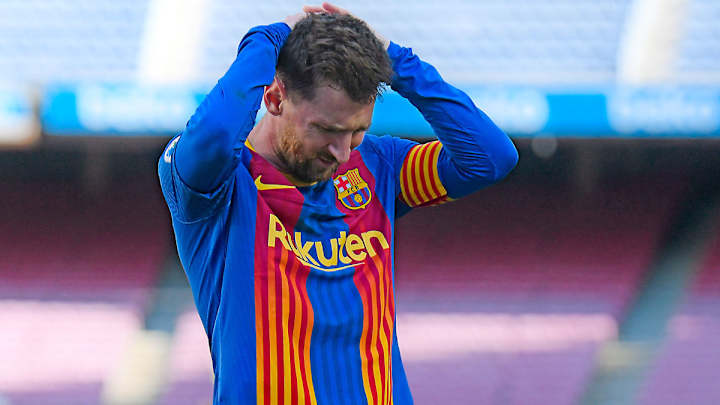As Barcelona Blames Everyone But Itself, Messi Becomes a Pawn in a Power Play

Perhaps a time will come when something significant happens involving one of the superclubs of European football and it does not feel like another chapter in the Super League saga. But it is not here yet. Where Lionel Messi plays next season will be the result of the same political and socioeconomic dynamics that led to that attempted breakaway in the spring—that and Barcelona’s dismal mismanagement.
It probably shouldn’t be a surprise that a handful of Catalan businessmen, some well-meaning, some self-serving, all essentially in place for their capacity to pander to the demands of the Barcelona fan base, are no match for the essentially unlimited wealth of Qatar and Abu Dhabi—especially not when the pandemic has heightened the gulf between the traditional elite, dependent on football for its revenue, and the new money that effectively exists outside the traditional market. But still, Barcelona has played a bad hand extraordinarily poorly.
Not that there has been any hint of self-awareness in Barcelona’s statements confirming that Messi will not be returning to the club despite a new pact appearing to be imminent.
“Despite FC Barcelona and Lionel Messi having reached an agreement and the clear intention of both parties to sign a new contract today, this cannot happen because of financial and structural obstacles,” the club said on Thursday. “As a result of this situation, Messi shall not be staying on at FC Barcelona. Both parties deeply regret that the wishes of the player and the club will ultimately not be fulfilled.”
Barcelona is $1.3 billion in debt, in part because of a string of overpriced and underperforming signings, in part because it has struggled to offload players on high salaries and in part because it was paying roughly $53 million net in basic wages after taxes to Messi. It offloaded Luis Suárez last season (and saw him help Atlético Madrid to the league title) and is openly looking to move on the likes of Samuel Umtiti, Philippe Coutinho and Antoine Griezmann.
Barcelona has negotiated Messi down to roughly half his previous wage but has been unable to re-register him after his previous contract expired because it remains in breach of La Liga’s financial fair play regulations. Nor has it been able to register its summer additions, such as Messi's countryman and longtime friend Sergio Agüero, signed on a free transfer from Manchester City. Those are the “financial and structural obstacles” of which Barça has complained.
There is another game being played here, though, beyond the basic rules. Would La Liga be so strict had Barcelona not sought to abandon it early in the year to found a Super League (of which it and Real Madrid remain two of the only three remaining members)? And then there’s the issue of private equity firm CVC Capital Partners’ purchase of a 10% stake in La Liga's revenues and a future commercial entity, which was announced on Wednesday despite opposition from Barcelona and Real Madrid.
At his press conference on Friday, president Joan Laporta reiterated the club’s attack on La Liga for signing the deal. His other comments, though, were more ambiguous, as he seemed simultaneously to blame the league for not accepting the deal Barça had reached with Messi, while also saying the club could not mortgage its future for one player.
In that sense the timing feels telling. Could it be this is a bluff from Barça, well aware that Messi is a large part of the league’s global commercial appeal? Is this an attempt to get CVC to apply pressure to La Liga to be merciful? If that is the hope, it may be a vain one. La Liga seems determined to wrest back control from the superclubs, and its rhetoric suggests a body thoroughly sick of the attempts of Real Madrid in particular to run the league for its own ends. Madrid has threatened legal action over the CVC deal, to which the league responded on Thursday by saying, “La Liga is not concerned about a possible legal action by Real Madrid, as it was a predictable reaction given the history of said club."
As for Messi, if he does leave Barça, there are only two realistic European destinations, as there had been last summer when he attempted to leave the club due to an acrimonious relationship with now-ex-president Josep Bartomeu—Manchester City and Paris Saint-Germain. Man City wanted him last year, when he tried to activate a contract clause to leave on a free transfer only to find he had missed the deadline, but after spending $139 million on Jack Grealish, and handing him the No. 10 shirt, it seems committed now to its pursuit of Harry Kane. Pep Guardiola confirmed as much in comments made on Friday. Which leaves PSG, which reportedly was in contact with Messi's camp on Thursday evening.
Messi has been open about his desire to link up once again with Neymar, and it can’t hurt that PSG’s coach, Mauricio Pochettino, is a fellow Rosarino. Having two such individualistic talents may not necessarily help PSG improve its Champions League record, but it would be a great symbolic victory, a logical end to the process it began with the record €222 million signing of Neymar from Barcelona in 2017. That was what provoked Barcelona’s ill-advised spending spree and inflated the market and what spooked the traditional powers into looking to restructure football to guarantee them an income, a process accelerated by the pandemic.
For that is modern football: Lionel Messi, perhaps the greatest player ever, has become a pawn, a trophy, in a game of soft-power politics.
More on Messi

An accomplished author of multiple books, Jonathan Wilson is one of the world’s preeminent minds on soccer tactics and history.